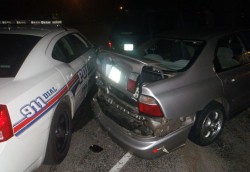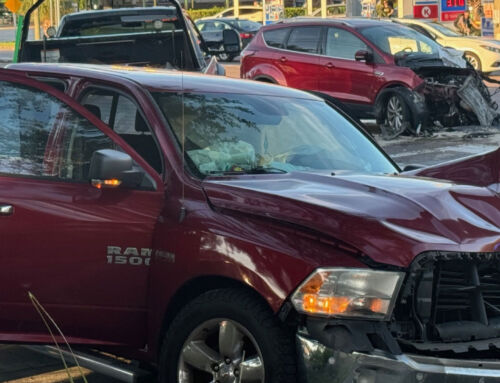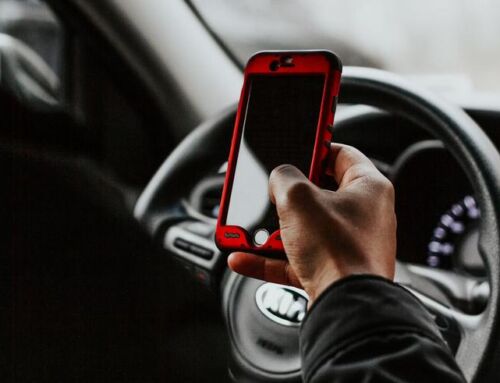Over the past several years in our personal injury practice in the State of Indiana we have been involved in cases where a police officer’s negligence caused a motor vehicle accident, killing or seriously injuring a client or client’s family member. When this occurs there are special difficulties in bringing an action against a police officer in most states and certainly in the State of Indiana which will be discussed below.
It was reported in the Indianapolis news recently that a woman was injured in an auto accident with an Indianapolis police officer and has spent years legally fighting with the City just to get her medical bills reimbursed.
The plaintiff, “Mrs. Kenny”, reported she was stopped at a red light on 30th Street in Indianapolis waiting to make a left turn when she was struck from behind by a police cruiser. She was struck so hard that her daughter who was sitting behind her was thrown over the seat “on top” of her. She was taken from the scene by ambulance and had serious injuries. The police officer admitted that he was looking down at his computer and wasn’t paying attention to where he was going causing the accident. This occurred in July of 2009, over 4 years ago. There was $8,300 in damage to her car and the police cruiser. “Mrs. Kenny” reported the city was “trying to make it seem like it was my fault when I was clearly in the right. He hit me from the back.” The case has now been recently scheduled for trial in 2014. This is an illustration of the difficulty encountered when a person makes a claim against the City and its police department.
While Indiana law provides that a person who is harmed as the result of the negligence of a City employee (including police officers) can recover damages this “right” comes with limitations.
When the City or any government entity is the defendant in a civil suit for injuries different rules apply. The government (City and State) benefit from what is known as “sovereign tort immunity”. The immunity protects the City, State and other government agencies and their employees by barring suit even when they are negligent and caused injuries to an individual. Over the years the State of Indiana has provided partial “waivers” of the sovereign immunity to allow the State, Cities, etc. to be sued for personal injury when their employees caused injury but have imposed restrictions and limitations as who can be sued and what an injured party can recover.
So what are the prerequisites and limitations to making a claim for who is injured by a police officer’s negligent operation of a motor vehicle?
State Tort Claim Notice
Before a claim can be filed in Court or made, a special notice must be sent to the governmental entity, in this case to the City. IC 34-13-3-8 requires the person making the claim within 180 days file a “tort notice” which is essentially a certified letter that includes the following information:
describe in a short and plain statement the facts on which the claim is based. The statement must include the circumstances which brought about the loss, the extent of the loss, the time and place the loss occurred, the names of all persons involved if known, the amount of the damages sought, and the residence of the person making the claim at the time of the loss and at the time of filing the notice.
Ind. Code Ann. § 34-13-3-10 (West). There are similar Statutes in most states. The certified letter must be submitted within a specified period of time after the date of the accident, which varies from State to State. If this is not done the claim will be “barred”. Once the State of Indiana receives the letter it will have a period of 90 days (I.C. 34-13-3-11) to investigate the claim. During this period of time the person making the claim is “barred” from filing suit. Once the State or the government agency or City “rejects” the claim or if it fails to respond within the time limit (in Indiana it is 90 days) the injured person can file a lawsuit.
What Can Be Recovered?
No matter how devastating or tragic the claimant’s damages are in Indiana and other States the recovery that can be made by the injured party is “capped”; i.e., limited in what can be recovered. In Indiana for any one claim made by an individual for any single claim there is a tort limitation of $700,000. What this means is that the most an injured party can ever recover is $700,000. However, under some circumstances for a single injured family member there may be more than one $700,000 limitation available. This is a good reason to consult with a personal injury attorney. An example of that would be in the instance where a child is the only one injured and the parents who were not injured (or perhaps even present) have a “loss of services” claim which essentially is the interruption of the relationship between the parents and their child. Even though this is “derivative” of the child’s claim [which means that if the defendant is found not to be negligent the parents also cannot recover]. The “cap” may also apply to the parents claim making the potential recovery a total of $1,400,000. See case State v. Eaton, 659 N.E.2d 232 (Ind. Ct. App. 1995).
Does Indiana’s Comparative Fault Apply to a Claim Against the Police Officer?
Indiana enacted the Comparative Fault Act (IC 34-51-2) in 1983. Prior to that time contributory negligence even to the slightest degree on the part of the claimant was a complete bar to recovery. As a result of lobbying efforts by the State of Indiana, the Comparative Fault Act enacted a provision which eliminated the State from the requirements of the Comparative Fault Act. Under Comparative Fault even if you are partially at fault up to 51% you may recover that portion of your damages. The State, City and, hence, the police officer and his department will prevail in the civil suit for damages if it is shown that the plaintiffs are even the slightest negligent in proximately causing the accident. This makes it very difficult in most cases for an injured party making a claim for personal injuries against a police officer and his department, or for that matter other governmental entities, to prevail.
Can I Sue the Police Officer?
Interestingly enough, in Indiana there is a statute which prohibits naming the police officer (or any governmental employee) as a defendant in a lawsuit for damages unless the governmental entity answers that the employee acted outside the scope of the employee’s employment. If that is the case the Plaintiff may amend the complaint and sue the employee personally. Ind. Code Ann. § 34-13-3-5 (West). In the event that an attorney in Indiana names the police department and the police officer immediately the City will move to have the police officer dismissed from the lawsuit and generally will prevail.
What Happens If the Police Officer is Off Duty When He Rear-ends My Car With The Police Cruiser?
It is often argued that when a person is injured by a police cruiser and the officer is off duty and on his own time (most police officers certainly in Marion County take their cruisers home with them at night) the question becomes can you now sue the police officer himself and assert the theory of comparative fault which allows for recovery even if the claimant is partially at fault. In Indianapolis there is a “City directive” that requires police officers be on duty 24 hours a day. One might suspect that this was created for the very purpose of subverting the likelihood of comparative fault being applied to an off duty police officer.
Why Do These Rules and Limitations to a Claim for Damages Still Exist?
Our State has taken the position that even though the “complete” immunity is partially waived, it must be careful not to open the floodgates of liability. The State has and continues to argue that the threat and burden of the high costs of civil liability would have a detrimental impact on our State’s budget. The downside of this of course is the limitation on an injured citizen’s right to sue and be fully compensated for the harm caused by a negligent employee of the State.
Why Consult An Attorney?
When making a claim against a police officer there are so many laws on how you must go about suing an officer, giving them notice, and a process that is clearly skewed to the benefit of the City Attorney’s/City’s benefit. This is why it is imperative that you call an experienced personal injury lawyer as soon as possible after your accident if you are injured and intend to make a claim.





